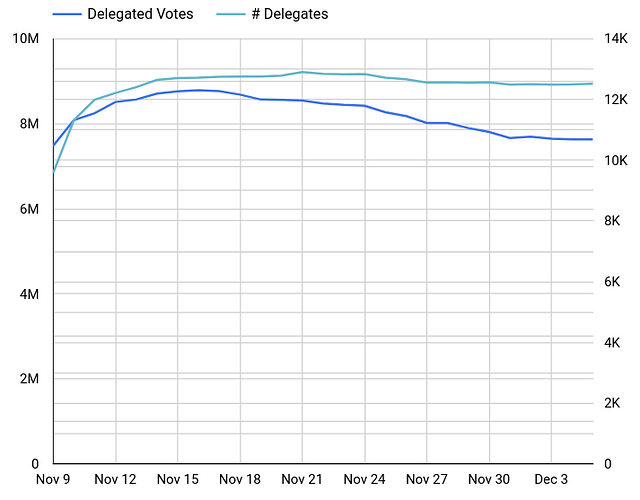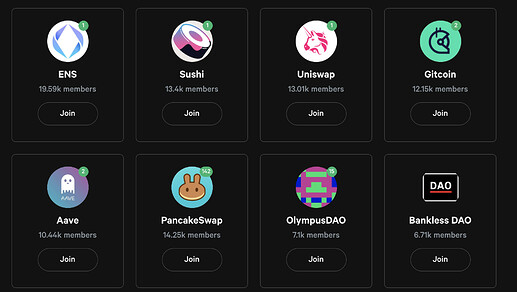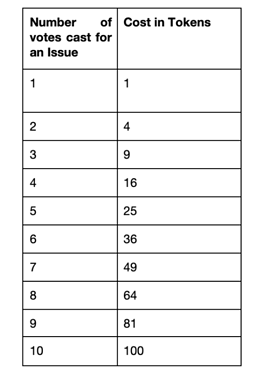The purpose of this post is to propose ideas and kickstart a solid discussion on what I consider to be a very important piece to the ENS puzzle.
I think it is very important to note that these are ideas which require maturing, and not meant to be a complete solution. I am completely open to any criticism or disagreements to any ideas proposed as the true goal of this topic is to generate community discussion to come up with a strong proposal to put forth.
I will edit this post as discussion on this topic continues in order to attempt consolidating all ideas into a single post to keep the ideas organized.
These are ideas I have had for a while now about how DAOs could generate leadership structures while increasing participation via incentives. I’ve written about this in other areas of the forum but I thought it really deserves its own post to kick off a serious discussion.
ENS is in a great position to do this as there is a legitimate product which brings in revenue, providing the elements necessary to create a symbiotic relationship between the web3 organization itself and the humans controlling it.
Problem: Dedicated Leadership
Most, if not all, successful organizations have dedicated leadership. Leaders who focus most of their energy in learning the organization and making decisions as to what is best for the organziation. Web3 (DAOs) will be no different, ENS included. We should design an incentive program which allows delegates to focus time needed on ENS.
Solution: Incentive Program for DAO Leaders - Delegates
ENS delegates have chosen to dedicate their time in order to participate in discussion and proposals, and many are dedicating time helping users as well, yay! In order to encourage the continued effort by these individuals, avoid early participation fatigue and compensate them for their time, I propose we create an incentive program funded by income from ENS registration fees.
I propose that the Incentive Program reward delegates based on the number of votes they control. How this is done, and to what degree must be discussed. Should it be linear, quadratic, base “pay” plus bonus over number of votes controlled? Should there be a minimum pay to help support “smaller” delegates? Should there be a max pay cap?
Problem: User participation
Delegates are acting as representatives to the users who chose to delegate their votes to said delegate. This is a responsibility the delegates take on behalf of the users. The users are participating in the DAO themselves by choosing which delegates they trust will make the correct decisions on their behalf. They choose to secure ENS tokens and guarantee participation by doing so themselves. We should encourage users to be ENS owners and participate!
Solution: User Incentives
I propose that the Incentive Program be inclusive of users as well as delegates. We are all in this together, and without the users participating by selecting a delegate, the delegates would not be honored with the responsibility of representing users and carrying the weight of the “constituents”.
Problem: Less Informed Users Voting
$ENS carries with it a great responsibility. It literally has full control over the DAO. IMO we dont want less informed users voting on proposals without a full understanding of what they are voting for and/or why, simply to receive incentives.
Solution: Stronger Incentives for Delegating Rather Than Voting
This solution may seem strange at first, but I think it is actually quite necessary. We really do want the votes coming from informed and well researched individuals who are dedicating the time necessary to fully understand the proposals and what they mean for ENS. So I propose that the Incentive Program actually give fewer incentives to self-delegated votes. This would encourage users who only wish to receive incentives to delegate their votes to more dedicated community leaders as opposed to simply voting for incentives.
One way I imagine that would work is that the Incentive Program would give a bonus to every user who assigns their votes to a delegate. This way if a user truly believes in ENS and is willing to dedicate the time such that they self-delegate, they will still receive incentives. Less so than delegating, but their passion will compete with their wallet to make the appropriate decision for themselves.
This could be easily bypassed by a user simply delegating to a second address they control, but those fringe scenarios are not a big deal, in my opinion, since serious delegates would likely want to signal their dedication by holding a healthy supply of $ENS themselves, which would not happen if they delegated their votes to a different address.
Problem: Actual Participation
We need to ensure that incentives for participation are only paid out to participants. The idea is not to create an incentive just for holding tokens, but for active participation.
Solution: Incentives For Participation ONLY
The incentives would pay out only to active participants. This one may be a bit tricky, because how does one quantify participation? Strictly basing this off proposal vote participation may be a bit too limited, definitely need some community help figuring out this one! Any Ideas?
The participation mechanism would be amplified by users. For example, if a delegate fails to garner a Participation Incentive, it is likely their ‘constituents’ would move their delegations to another delegate in order to not miss out on future Incentives. Thus the delegates incentive to participate is greater.
Problem: Too Much Control To Any Single Delegate
One concern would be that a few delegates, perhaps those with significant followers, could receive more delegate votes than would be healthy for the DAO, allowing only a few key delegates to manipulate the DAO to their own demands by carrying a significant portion of votes.
Solution: Cut Off Incentives When Threshold is met
By removing incentives any time a delegate reaches a certain threshold - I’m thinking something like a significant % of total tokens in circulation - then users will not assign their votes to that delegate because they would be forfeiting their Incentive earnings. Thus the Incentive Program itself should regulate total voting power of delegates to prevent a select few users from gaining overwhelming voting power.
Summary
This is a skeleton of an idea to kickstart discussion of the idea. The basic principal is to incentivize user participation by rewarding those users with ENS. This would accomplish multiple positive results:
- Increase participation in the DAO, strengthening it
- Harden the DAO by encouraging healthy distribution across many delegates
- Strengthen the DAO by continually removing $ENS from users who no longer wish to hold it, and distributing it to participating $ENS members
Basic ideas:
- incentivize delegates to accumulate votes and participate
- incentivize users to delegate their votes by providing a bonus incentive for delegating to another address, incentivizing votes be delegated to knowledgeable, dedicated users.
- incentivizing active and continued participation
- disincentivize any delegate from accumulating too much voting power
A few of the suggestions would need some major discussion such as:
- how much funds to dedicate to incentives; should it be a static amount or dynamic based on # of proposals or registrations in any given distribution period?
- how often should distribution periods happen; Should they be scheduled, distributed upon any proposal completion, etc?
- what % of total votes in circulation is too much for any single delegate?
- do we distribute funds based on total votes controlled; would it be linear, quadratic, etc; is there a cap, or max distribution; is there a base, or minimum distribution so as to not discourage “smaller” delegates?
- ?
Thank you for taking the time to read this wall of text!
GraspOnCrypto


